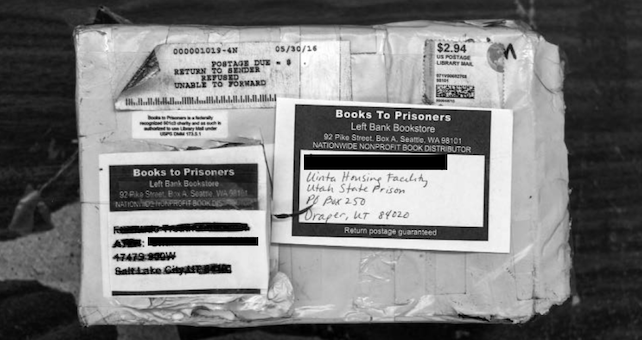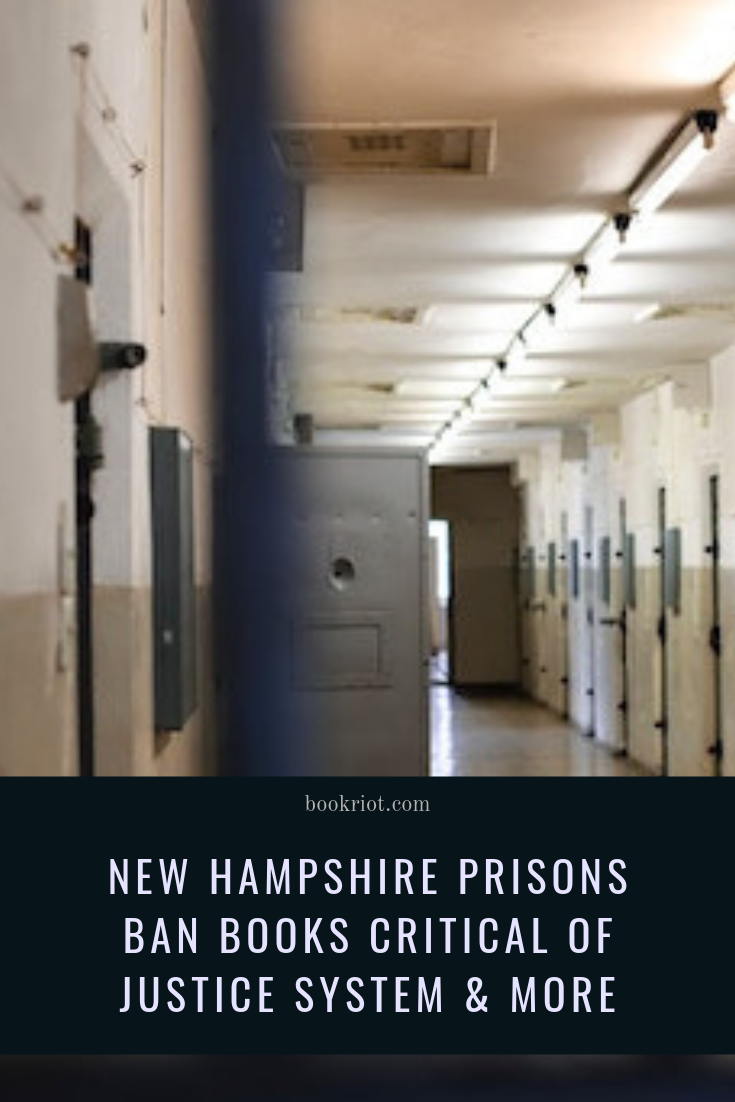
New Hampshire Prisons Ban Books Critical of Prison System, Award Winners
In stories that seem to be unfolding rapidly in recent months, New Hampshire joins the ranks of several other states, including Arizona, to ban books that are critical of the justice and prison systems.
The Human Rights Defense Center (HRDC), a nonprofit which advocates on behalf of those held in correctional facilities throughout the US, recently acquired a list of specific titles and their associated violations for those incarcerated in New Hampshire.
According to the mail policies and procedures as outlined by the state prison system, the following printed materials (i.e., books) are in violation of policy and subject to rejection:
- Obscene material, as determined by the LRC, the Commissioner, or a court of law, and including publications containing explicit descriptions, advertisements or pictorial representations of sexual acts involving penetration, bestiality, bondage, sadomasochism, or sex involving children and including, but not limited to material that violates RSA 650:1, will not be permitted.
- Sexually explicit and/or offensive material that would be detrimental to treatment of inmates or that would encourage or educate inmates in deviant or unlawful sexual practices as determined by the sex offender treatment clinical staff will not be permitted.
- Nudity or sexual depictions that violate no other provisions of this policy and/or which have scholarly, medical or purely artistic value may be admitted.
- Any materials that may jeopardize institutional security.
Determinations of literature that violates any of the groups above is made by four individuals, which include a representative from security, mental health, and education/programs and a facility Librarian/Media Generalist.
What the HRDC has found, though, differs from the above-listed parameters. On the list of books that have been banned from those in New Hampshire prisons and the rationale include the following:
- The Lovely Bones by Alice Sebold for being “sexually explicit & offensive.”
- Blood in the Water by Heather Ann Thomas for being “security concerns-encourage group disruption” — this is a Pulitzer-prize winning book about the Attica uprising. The author sued the Illinois Department of Corrections last fall for banning the title.
- Prison Nation by Tara Herival and Paul Wright for “security threat group/white supremacy” — this book is about the prison-industrial complex and often paired with books like The New Jim Crow for understanding the system.
- Locked Up But Not Locked Down by Ahmariah Jackson and Iatomic Seven for “institutional security concerns” — this is a book about surviving the American prison system.
- Coming Out of Concrete Closets by Jason Lydon and others for “unlawful sexual practice” — this is a book that came out of a survey of 1200 folks experiencing incarceration who identified as queer and what it was like in the system for them.
- The Factory: A Journey Through the Prison Industrial Complex by Christopher Lordan and Robert Dellelo, for “encourage activities that may lead to group disruption” — a book about Delello’s own experience behind bars and about the school-to-prison pipeline more broadly.
Books that critique the prison system have seen similar bans across the US, including Arizona as noted above — with the ACLU threatening a lawsuit if the book isn’t reinstated — as well as Behind Bars by Jeffrey Ian Rose in Washington state. Nelson Mandela’s A Prisoner in the Garden has been banned by California, while the state of Connecticut has banned Prison Legal News and Coalition for Prisoner Rights magazines.
North Carolina prisons banned The New Jim Crow but after public outcry, the book was reinstated.
It needs no repeating that access to books reduces recidivism, but equally as valuable is the right for those behind bars to have access to information about the very systems they’re experiencing. This is especially true as it becomes clearer and clearer that reasons for the banning of these books is inconsistent with already-existing policies or, worse, incorrect (see “white supremacy”).
Moreover, in a system where incarcerated people are more likely to be black than white (475,900 to 436,500, according to a PEW report from April 2019) and where the prison population doesn’t at all mirror the general population (12% of the US population is black, as opposed to 33% of the prison population; 16% of the US population is Hispanic, while making up 23% of the prison population), it’s even more crucial for those of color and those who do not identify as cis or straight to have access to information and tools to help them work through the white prison industrial complex. Prisons which choose to withhold these books are not doing so to help those who need help. They’re instead upholding white supremacy itself.
You can do something, though. Get your hands on your keyboards and write a letter to the Governor of New Hampshire, Christopher Sununu, or call and leave a message on his voicemail highlighting the concern over banning crucial books to the incarcerated. Governor Sununu’s contact information is on the state website.
It might also be worth reaching out to the New Hampshire Department of Corrections. Information about how to reach the NHDOC is available on their website. No specific individual has been named because anyone you can reach is worth reaching.
Banning books to prisoners is an epidemic, and withholding books that critique or offer insight into the justice system is a further cruelty.
Also In This Story Stream
- What Young People Can Do About Book Bans: Book Censorship News, April 12, 2024
- Sexual Assault Awareness Month & Book Banning: Book Censorship News, April 5, 2024
- How Public Libraries Are Targeted Right Now—It’s Not “Just” Books: Book Censorship News, March 29, 2024
- The 2024 Lambda Literary Awards Shortlists Are Here
- You’re Wrong About These Common Myths About Book Ban: Book Censorship News, March 22, 2024
- State Anti-Book Ban Legislation Updates: Book Censorship News, March 15, 2024
- They’re Dismantling Higher Education, Too: Book Censorship News, March 8, 2024
- The Landmine of Common Sense Media: Book Censorship News, March 1, 2024
- What Updates Should Library Collection Policies Include?: Book Censorship News, February 23, 2024
- Targeting Demographic Data to Skew Reality: Book Censorship News, February 16, 2024












